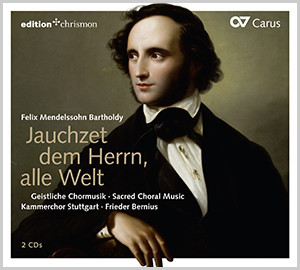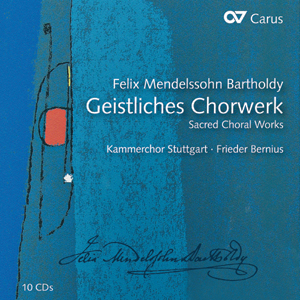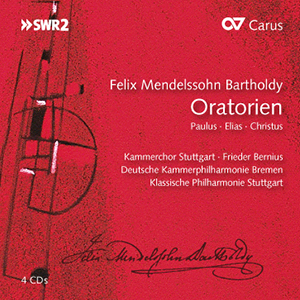
Jauchzet dem Herrn, alle Welt. Geistliche Chormusik
To mark the 50th anniversary of the choir, this double CD presents the highlights of the complete recording: the most beautiful psalms, church hymns, chorales, mass movements, excerpts from the oratorios and the Lobgesang. From "Denn er hat seinen Engeln" to "Verleih uns Frieden" - Frieder Bernius' masterful interpretations unfold Mendelssohn's sense of cantabile melody and differentiated harmony in colorful, transparent diction.
Sommaire
-
Compositeur
Felix Mendelssohn Bartholdy
| 1809-1847
-
L'auteur de l'avant-propos
Frieder Bernius
| 1947Frieder Bernius’s work has earned great worldwide recognition. He is in demand internationally as a conductor and as a teacher. His principal artistic collaborators are the ensembles he founded himself, the Kammerchor Stuttgart, the Barockorchester Stuttgart, the Hofkapelle Stuttgart and the Klassische Philharmonie Stuttgart. As a guest conductor, he has collaborated repeatedly with, for example, the SWR Vokalensemble Stuttgart, the Deutsche Kammerphilharmonie Bremen, the Stuttgarter Kammerorchester and the Streicherakademie Bozen. Great stylistic versatility is Frieder Bernius’s hallmark. Whether he conducts vocal works by Monteverdi, Bach, Händel, Mozart, Beethoven, Fauré and Ligeti, stage music by Mendelssohn or symphonies by Haydn, Burgmüller and Schubert, his work always aims for a sound that is at once unmistakably personal and at the same time oriented towards the original period sound ideal. He devotes himself equally to the rediscovery of 18th century operas and to first performances of contemporary compositions. He is particularly interested in the musical history of southwestern Germany. Carus-Verlag has awarded Frieder Bernius a Golden CD for his complete recording of the sacred music of Felix Mendelssohn Bartholdy. The award was presented to him during the German Choir Festival in Stuttgart 2016. The sale of over 250,000 recordings, which has been acclaimed with a number of awards, has made a not insignificant contribution to what today is the obvious presence of Mendelssohn's complete œuvre in the concert repertoire. Plus d'information sur la personne
-
L'auteur de l'avant-propos
Felix Loy
| 1963
-
Chœur
Kammerchor Stuttgart
The Kammerchor Stuttgart is regarded as one of the best ensembles of its kind. Over its fifty-year existence, Frieder Bernius has developed the choir into an exceptional ensemble acclaimed by audiences and press alike. This has led to invitations for the choir to perform at all the important European festivals. In Germany the chamber choir performs at festivals and in concert halls in repertoire ranging from the 17th to the 21st century. Frieder Bernius and his ensemble have received numerous accolades for their contribution to new music. The Kammerchor Stuttgart has made over 80 CDs and LPs, numerous of which have been awarded international recording prizes (including the Edison award, Diapason d’or, Gramophone Choice, Classical Internet Award, International Classical Music Award, and German Record Critics’ Award prizes). The International Federation for Choral Music has invited the ensemble to sing at the 1st, 4th and 10th World Symposia on Choral Music in Vienna, Sydney and Seoul. Regular tours of North America and Asia since 1988 and a South America tour reflect the Kammerchor Stuttgart’s international reputation. Since 1984 the top ensemble has also been invited to Israel biennially. Plus d'information sur la personne
-
Orchestre
Stuttgarter Kammerorchester
Founded in 1945, the Stuttgarter Kammerorchester is the oldest and most renowned ensemble of its kind and for over 65 years it has occupied an outstanding position in international orchestra culture. Michael Hofstetter has been the conductor of this ensemble since September 2006. The orchestra had already earned its excellent reputation under its founder and long-time director, Karl Münchinger. Through a completely new and exemplary style of interpretation of the works of Johann Sebastian Bach the Stuttgarter Kammerorchester became a pathfinder in the field of historical performance practice. Dennis Russell Davies, its principal conductor, from 1995 to 2006, expanded the repertoire of the orchestral, especially with works from 20th century. In 2008 the orchestra was awarded the European Chamber Music Award by the European Foundation for Culture. Plus d'information sur la personne
-
Orchestre
Die Deutsche Kammerphilharmonie Bremen
The Deutsche Kammerphilharmonie Bremen is one of the world's leading orchestras, captivating audiences everywhere with its unique style of music-making. The Estonian conductor Paavo Järvi has been the orchestra's Artistic Director since 2004.
One of the many highlights of the collaboration with Paavo Järvi has been their Beethoven Project, on which conductor and orchestra concentrated for six years. Their Beethoven interpretations have been acclaimed worldwide by audiences and critics alike as benchmark performances. Following the Beethoven Project The Deutsche Kammerphilharmonie Bremen and Paavo Järvi focused on Robert Schumann's symphonic works with equal success.
The latest project of the orchestra and its conductor is the German composer Johannes Brahms. The first CD (Sony/RCA) of the project – Symphony No. 2, Tragic Ouverture and the Academic Festi-val Ouverture – was released in autumn 2017 and received the Opus Klassik in October 2018. The second CD, including Symphony No. 1 and the Haydn-Variations, followed in autumn 2018. With the third and fourth Symphony, released in March 2019, the symphony cycle has come to completion.
Highlight of the project was the internationally acclaimed performance of ›A German Requiem‹ on the 10th of April 2018 at Bremen Cathedral, 150 years after the first performance. The recording has now been released on DVD and Blu-ray by C-Major. In October 2019, ›The Brahms Code‹ – an excit-ing TV/DVD documentary about the Brahms Project produced by Deutsche Welle/Unitel – was re-leased and is the current German Record Critics' Award winner in the category music film (listed 1/20).
The Deutsche Kammerphilharmonie Bremen has been honoured with countless prizes such as Echo, Opus and Diapason d'Or for its recordings and the unique education project with the Gesamtschule Bremen-Ost in Osterholz-Tenever, the Zukunftslabor. For years, the orchestra has cultivated close musical friendships with international soloists such as Christian Tetzlaff, Maria João Pires, Janine Jansen, Igor Levit, Hilary Hahn and Martin Grubinger.
The Deutsche Kammerphilharmonie Bremen is permanent guest orchestra at the Elbphilharmonie Hamburg and Festival Orchestra of Kissinger Sommer. Plus d'information sur la personne
-
Orchestre
Klassische Philharmonie Stuttgart
La Klassische Philharmonie Stuttgart se compose de musiciens d’orchestres symphoniques et d’ensembles chambristes allemands de première classe qui travaillent depuis longtemps avec Frieder Bernius. L’orchestre joue sur des instruments modernes mais chef d’orchestre et musiciens accordent une importance particulière à la différenciation stylistique. Dans la représentation d’œuvres symphoniques chorales à grande distribution, la Klassische Philharmonie Stuttgart est le pendant orchestral au Kammerchor Stuttgart. La Klassische Philharmonie Stuttgart a participé à différents festivals comme le Festival musical du Rheingau, le Festival musical européen de Stuttgart, le Festival international de Bade-Wurtemberg, le festival « Wratislavia Cantans » de Wroc³aw (Pologne), les Journées musicales de Kassel, la Société philharmonique de Bruxelles et les Herbstliche Musiktage de Bad Urach. L’idée de créer un partenaire instrumental de niveau équivalent au Kammerchor Stuttgart a été dernièrement consacrée par le Requiem allemand de Johannes Brahms enregistré ensemble. La revue française Répertoire a certifié à Frieder Bernius que sa vision de l’œuvre est une « pulvérisation discographique ». Plus d'information sur la personne
-
Chef d'orchestre
Frieder Bernius
| 1947Frieder Bernius’s work has earned great worldwide recognition. He is in demand internationally as a conductor and as a teacher. His principal artistic collaborators are the ensembles he founded himself, the Kammerchor Stuttgart, the Barockorchester Stuttgart, the Hofkapelle Stuttgart and the Klassische Philharmonie Stuttgart. As a guest conductor, he has collaborated repeatedly with, for example, the SWR Vokalensemble Stuttgart, the Deutsche Kammerphilharmonie Bremen, the Stuttgarter Kammerorchester and the Streicherakademie Bozen. Great stylistic versatility is Frieder Bernius’s hallmark. Whether he conducts vocal works by Monteverdi, Bach, Händel, Mozart, Beethoven, Fauré and Ligeti, stage music by Mendelssohn or symphonies by Haydn, Burgmüller and Schubert, his work always aims for a sound that is at once unmistakably personal and at the same time oriented towards the original period sound ideal. He devotes himself equally to the rediscovery of 18th century operas and to first performances of contemporary compositions. He is particularly interested in the musical history of southwestern Germany. Carus-Verlag has awarded Frieder Bernius a Golden CD for his complete recording of the sacred music of Felix Mendelssohn Bartholdy. The award was presented to him during the German Choir Festival in Stuttgart 2016. The sale of over 250,000 recordings, which has been acclaimed with a number of awards, has made a not insignificant contribution to what today is the obvious presence of Mendelssohn's complete œuvre in the concert repertoire. Plus d'information sur la personne
-
Chef d'orchestre
Frieder Bernius
| 1947Frieder Bernius’s work has earned great worldwide recognition. He is in demand internationally as a conductor and as a teacher. His principal artistic collaborators are the ensembles he founded himself, the Kammerchor Stuttgart, the Barockorchester Stuttgart, the Hofkapelle Stuttgart and the Klassische Philharmonie Stuttgart. As a guest conductor, he has collaborated repeatedly with, for example, the SWR Vokalensemble Stuttgart, the Deutsche Kammerphilharmonie Bremen, the Stuttgarter Kammerorchester and the Streicherakademie Bozen. Great stylistic versatility is Frieder Bernius’s hallmark. Whether he conducts vocal works by Monteverdi, Bach, Händel, Mozart, Beethoven, Fauré and Ligeti, stage music by Mendelssohn or symphonies by Haydn, Burgmüller and Schubert, his work always aims for a sound that is at once unmistakably personal and at the same time oriented towards the original period sound ideal. He devotes himself equally to the rediscovery of 18th century operas and to first performances of contemporary compositions. He is particularly interested in the musical history of southwestern Germany. Carus-Verlag has awarded Frieder Bernius a Golden CD for his complete recording of the sacred music of Felix Mendelssohn Bartholdy. The award was presented to him during the German Choir Festival in Stuttgart 2016. The sale of over 250,000 recordings, which has been acclaimed with a number of awards, has made a not insignificant contribution to what today is the obvious presence of Mendelssohn's complete œuvre in the concert repertoire. Plus d'information sur la personne
-
Solist - soprano
Krisztina Laki
-
Solist - soprano
Ruth Ziesak
-
Solist - soprano
Andrea Lauren Brown
Musique baroque ou contemporaine, lied ou opéra – la soprano Andrea Lauren Brown sait convaincre par l’éclat et la légèreté de ses interprétations. Elle a donné ses débuts sur la scène lyrique dès l’âge de dix-sept ans dans A Wrinkle in Time de Libby Larsen. Elle a ensuite commencé à étudier à la West Chester University, au Westminster Choir College de Princeton, New Jersey et au Mozarteum de Salzbourg. En Europe, la soprano, lauréate de concours à plusieurs reprises, a été invitée à chanter au Theater an der Wien, au Festspielhaus de Baden-Baden, lors des festivals de Schwetzingen et Ludwigsburg, lors du Festival de Spoleto et du Festival Schumann de Düsseldorf. Plus d'information sur la personne
-
Solist - ténor
Werner Güra
Werner Güra accomplit ses études au Mozarteum de Salzbourg. Il poursuit sa formation vocale auprès de Kurt Widmer à Bâle et Margreet Honig à Amsterdam. Il a été invité à se produire aux opéras de Francfort, Bâle, Dresde, Paris et Bruxelles. On peut l’entendre régulièrement au Staatsoper de Berlin depuis 1999. En qualité d’interprète de concert et d’oratorio, Werner Güra travaille souvent avec des orchestres et des chefs de renom. Des tournées l’ont conduit plusieurs fois au Japon. Werner Güra est aussi un interprète de lied reconnu, ce qu’attestent des prestations pour des organisateurs de concerts internationaux, ainsi que de nombreux enregistrements récompensés de prix aussi prestigieux que le « Diapason d’or ». Plus d'information sur la personne
-
Solist - basse
Michael Volle
Critiques
... Das Ergebnis kann sich hören lassen. Es ist beste Werbung für die ausgefeilte Gesangskultur des Chores, der die Musik stilsicher und klangvoll mit viel Liebe fürs lyrische Piano ausdeutet. Zudem ist zu hören, dass mit Frieder Bernius ein Dirigent am Werk ist, für den Mendelssohn Herzenssache ist.
Ausgewogen ist auch die Auswahl ... Für solch eine musikalisch, dramaturgisch und optisch gut aufbereitete Silberscheibe ist im Regal immer noch Platz - auch dann, wenn es an sich gar kein großes Komponisten-Jubiläum zu feiern gibt.
Hagen Kunze, DER SONNTAG, Nr. 05 | 3.2.2019
... Ausgezeichnet ist die Leistung des Chores. Er singt stilrein, intontionssicher und klangschön. ... Alles in allem sind die CDs ein großes und ergreifendes Hörvergnügen, das musikalischem Geschmack ebenso zu genügen vermag wie dem Genuss musikalisch gefasster „geistlicher Speise.“
Hartmut Handt, Blessings 4 you, 12/2018
... All das und noch mehr wird von Frieder Bernius und dem Kammerchor Stuttgart in perfekter Stimmgebung und Phrasierung. mit der gesamten dynamischen Palette gestaltet.
CHOR aktuell, Dezember 2018
... Die schönsten Psalmen, Kirchenlieder, Choräle, Messsätze, Ausschnitte aus den Oratorien und dem Lobgesang finden sich hier in hervorragender, facettenreicher Interpretation versammelt. ... Klangvolles (nicht nur) für eine besinnliche Weihnachtszeit.
Austria Presse Agentur, 12.12.2018
... die meisterhaften Interpretationen von Frieder Bernius entfalten Mendelssohns Sinn für kantable Melodik und differenzierte Harmonik in hoher Klangkultur und farbiger, transparenter Diktion.
Verband Deutscher Konzertchöre, Dezember 2018
... Da gibt es keine verweichlichten Süßigkeiten zu hören, sondern glasklare Produkte eines starken künstlerischen Willens, gepaart mit perfekter Satztechnik und mit hoher Sanglichkeit, die sich Mendelssohn schon als Teenager bei der Berliner Singakademie angeeignet hatte. Martin Luthers Gemeindechoräle bieten ihm eine kantige Basis für seine klanglichen Visionen. All das und noch mehr wird von Frieder Bernius und dem Kammerchor Stuttgart in perfekter Stimmgebung und Phrasierung, mit der gesamten dynamischen Palette gestaltet ...
Gustav Danzinger, Ö1, 24.10.2018
Questions fréquentes sur l'œuvre
 Il n'y a pas encore de questions et réponses concernant cette œuvre ou vous n'avez pas trouvé la réponse à votre question sur l'œuvre ? Cliquez ici et envoyez votre question spécifique à notre service clients.
Il n'y a pas encore de questions et réponses concernant cette œuvre ou vous n'avez pas trouvé la réponse à votre question sur l'œuvre ? Cliquez ici et envoyez votre question spécifique à notre service clients.









